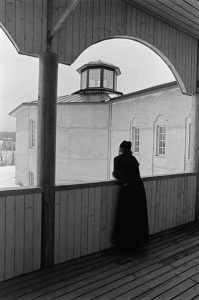Ord Om ordet
19. søndag B
1 Kings 19.4-8: I have had enough!
Ephesians 4.30-5.2: Never lose your temper.
John 6.41-51: They will be taught by God.
A disarming, sometimes perplexing feature of the Judaeo-Christian Scriptures is the way in which they refuse to mask or prettify human character. The Bible’s patriarchs and prophets, apostles and preachers are presented as subject to familiar anxieties, pitfalls, and tensions. No one is idealised. All make mistakes, and are invited to learn from them, having tasted their consequence.
For this reason even the greatest heroes turn out to be approachable. We find that they touch us where we are. Therefore they can credibly invite us to aspire to the heights that, by grace, they have reached.
In our first reading we hear Elijah, chief among prophets, herald of the New Testament, declare: ‘I’ve had enough!’ By the time this incident occurs, he has, true, been through a lot. He has multiplied food and raised the dead. He has taken Israel’s false prophets to task and slain the 450 prophets of Baal. He has staunchly resisted the pressures of Ahab, Judah’s king, and his odious Phoenician queen Jezebel. After all that, it would have been nice with a little recognition, a pat on the back, a prophetic sabbatical, perhaps. Instead he finds himself alone, under hostile attack, relegated to the wilderness. Elijah feels undervalued and overburdened, sick of always having to bear the brunt of everyone else’s wickedness and stupidity. ‘Lord, I’ve had enough!’
There’s determination in that outcry. I dare say there’s a fair share of anger as well.
Most of us will recognise this attitude. There will have been times when we have felt unfairly treated, unseen, exploited. Our evaluation may have been correct. Perhaps we were victims of injustice. In principle injustice should be righted, of course; we should address its causes, alleviate its effects. But the fact remains: the world in which we now live, wounded by sin, just isn’t a just world.
Sometimes there are loads to be carried. Someone’s got to roll up their sleeves and say, ‘Alright, I’ll carry this for a while’. This can happen even in societies firmly committed to corporate high ideals. St Benedict, in his Rule, tells us upfront that even monks may have to put up with false brethren. It may happen that we are wrongly accused of things, suffer unmerited hardship, etc. This isn’t necessarily because the community is evil or because a cabal of wicked enemies is out to get me, poor me. It is because even a monastery exists within a world in which redemption is still being perfected and ancient curses are at work complicating relationships, darkening perspectives.
This is our reality while we await the coming of a new earth where innocence will shine like the dawn, justice like the noonday sun. There isn’t always a quick fix to circumstances. What we can always change, though, is the way we receive them.
St Benedict warns us against nursing grudges. In Gilead, the Rev’d John Ames remarks in this regard: ‘I have always liked the phrase “nursing a grudge”, because many people are tender of their resentments, as of the thing nearest to their hearts.’ How true. And how pathetic. No human attitude is more utterly unproductive of good.
Consider how God deals with Elijah self-pityingly pulling the duvet over his head after pouring forth his grievances. God neither cajoles nor caresses; he doesn’t invite Elijah to tell his whole story from the beginning; nor does he try to explain. He simply, by the hand of an angel, touches him (there is kindness in that touch), gives him a scone, of all things, and tells him, ‘Get up and eat’, reminding him that he still has far to go.
We sense that God does not find Elijah’s outburst worthy of address because it is not worthy of Elijah. Instead he recalls him to his task, affirms him in his commission, implicitly saying: ‘Look, I’ve entrusted this business to you; I trust you to complete it’. That is all Elijah needs to put away childish things and rise to full stature. In fact, this episode leads into a great contemplative grace, as if the point of it were to evacuate a residue of human resistance standing in the way of vision.
This Biblical story makes me think of a passage in Tito Colliander’s memoirs, describing one of the ancient monks of New Valamo. Colliander had gone to see this monk in his cell. The monk suffered numerous ailments, was in real pain. Huddled in his bed he lamented and groaned, struck down by weakness, reduced, it would seem, to an articulate repository of suffering, helplessly at its mercy. Then the church bell began to ring for vespers. Colliander recounts the transformation that took place before his eyes. The old man, who a moment ago had resembled an infant, switched, as it were, to another dimension of consciousness awakened by the bell. Colliander heard him mumble to himself: ‘But I am a monk!’ Laboriously he sat up, pulled on his boots. He then rose, put on his habit, his cross, got his staff. Suddenly he stood there with dignity, upright, turned to Colliander and said: ‘I’m going’. Then went to acquit himself of his duty.
‘Arise, you still have a long way to go’.
By learning to live on these terms we shall begin to grow up as Christians, learning little by little what a Eucharistic existence amounts to. ‘Stop complaining!’, Jesus tells us in the Gospel. He then promises, ‘They will all be taught by God’. Our God went up to Jerusalem, with all that that entailed. Let us follow him there freely and maturely, singing.
Amen.

Photograph from New Valamo.
